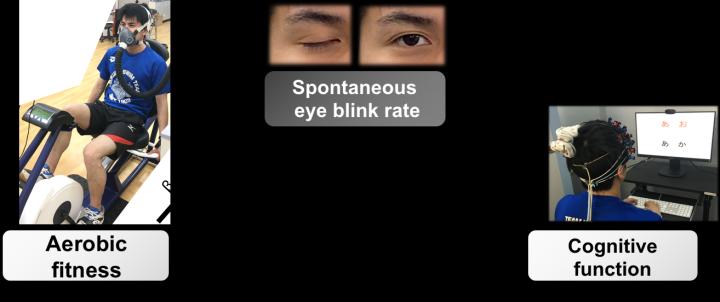Researchers from the University of Tsukuba find that spontaneous eye blink activity explains the link between physical activity and cognitive function

Credit: University of Tsukuba
Tsukuba, Japan – Although exercise is known to enhance cognitive function and improve mental health, the neurological mechanisms of this link are unknown. Now, researchers from Japan have found evidence of the missing link between aerobic fitness and cognitive function.
In a study published in Medicine & Science in Sports & Exercise, researchers from the University of Tsukuba revealed that spontaneous eye blink rate (sEBR), which reflects activity of the dopamine system, could be used to understand the connection between cognitive function and aerobic fitness.
The dopaminergic system is known to be involved in physical activity and exercise, and previous researchers have proposed that exercise-induced changes in cognitive function might be mediated by activity in the dopaminergic system. However, a marker of activity in this system was needed to test this hypothesis, something the researchers at the University of Tsukuba aimed to address.
“The dopaminergic system is associated with both executive function and motivated behavior, including physical activity,” says first author of the study Ryuta Kuwamizu. “We used sEBR as a non-invasive measure of dopaminergic system function to test whether it could be the missing link between aerobic fitness and cognitive function.”
To do this, the researchers asked healthy participants to undergo a measure of sEBR, a test of cognitive function, and an aerobic fitness test. They also measured brain activity during the cognitive task using functional near-infrared spectroscopy.
“As expected, we found significant correlations between aerobic fitness, cognitive function, and sEBR,” explains Professor Hideaki Soya, senior author. “When we examined these relationships further, we found that the connection between higher aerobic fitness and enhanced cognitive function was mediated in part by dopaminergic regulation.”
Furthermore, activity in the left dorsolateral prefrontal cortex (l-DLPFC) during the cognitive task was the same or lower in participants with higher sEBR compared with lower sEBR, even though those with higher sEBR appeared to have greater executive function, and thus higher neural efficiency.
“Although previous studies have indicated that aerobic fitness and cognitive function are correlated, this is the first to provide a neuromodulatory basis for this connection in humans. Our data indicate that dopamine has an essential role in linking aerobic fitness and cognition,” says first author Kuwamizu.
Given that neural efficiency in the l-DLPFC is a known characteristic of the dopaminergic system that has been observed in individuals with higher fitness and executive function, it is possible that neural efficiency in this region partially mediates the association between aerobic fitness and executive function. Furthermore, physical inactivity may be related to dopaminergic dysfunction. This information provides new directions for research regarding how fitness affects the brain, which may lead to improved exercise regimens. For instance, exercise that specifically focuses on improving dopaminergic function may particularly boost motivation, mood, and mental function.
###
The article, “Spontaneous Eye Blink Rate Connects Missing Link between Aerobic Fitness and Cognition,” was published in Medicine & Science in Sports & Exercise
(DOI: 10.1249/MSS.0000000000002590).
Media Contact
Naoko Yamashina
[email protected]
Related Journal Article
http://dx.




